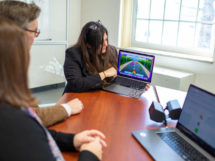 Innovation is the name of the game in business, and especially in services such as accounting. Firms are decades beyond just balancing the books, current tax compliance and reminding clients to make quarterly payments – though they still do all of that. Accounting firms now also serve as business consultants and are decidedly tech-forward as they deliver information to clients in the cloud and via mobile apps.
Innovation is the name of the game in business, and especially in services such as accounting. Firms are decades beyond just balancing the books, current tax compliance and reminding clients to make quarterly payments – though they still do all of that. Accounting firms now also serve as business consultants and are decidedly tech-forward as they deliver information to clients in the cloud and via mobile apps.
Today’s accounting firms are as equally versed in cybersecurity as balance sheets.
“Everything has changed over the past 20 years, and accounting firms (have changed) right along with it,” said Lindy Karns, director emeritus of accounting and advisory firm Blue and Co. “All service companies are based on that: service.”
Cybersecurity remains high on clients’ solution needs list.
“Technology services are another of those things that keep our clients up at night, and our goal is to help them sleep peacefully, having transferred their worries to us,” Karns said. “We, like many firms, have made significant investments in a variety of tools and applications to improve our efficiency in completing work and data analysis, to ensure we are able to transmit information with our clients in a secure fashion, and to facilitate working with clients in different geographic areas.”
In addition to growing their capabilities through proactive investments in tech equipment and practices, she said, protective and defensive components are being added.
“CPA firms are frequently the target of bad players attempting to access the client data to which we have access,” Karns said.
The core function remains
Accounting is the language of business, according to the Warren Buffett phrase repeated in interviews and books. Numbers speak. They tell a story with plot points and characters, theme and setting, conflict and resolution, and a beginning, middle and end.
The language of public accounting changed over 500 years ago, when Italian mathematician Luca Pacioli explained about the Venetian method of bookkeeping in his book “Summa de Arithmetica, Geometria, Proportioni et Proportionalita.” The merchants of Venice were using a double-entry system—balance—for keeping track of debits and credits.
“Double-entry accounting is centuries old, and is still how we keep the books, electronically or otherwise,” Karns said, “but as the needs of our clients have grown, we have grown to meet those needs. Our clients are looking for good, sound, reasoned business advice, and the bells and whistles to execute that.”
Traditional accounting services remain foundational but 21st-century accounting firms have added business consulting and other outsourced offerings, including technology and information technology services.
Blue and Co. LLC is a regional accounting firm founded in 1970 in Indianapolis. Now a U.S. top-60 CPA firm, Blue and Co. has 11 offices with 450 employees in Indiana, Kentucky and Ohio. The Kentucky offices are located in Lexington and Louisville. Blue and Co., directly or through strategic partnerships, offers benefits consulting, business services, business valuation, economic incentive consulting, IT consulting, cost segregation, and research and development credit services. The latter is for an R&D tax credit available for businesses since 1981.
“Having a seasoned group of individuals with industry specialization, and the extended services to help clients where they have soft spots in their organizational structure, is the key to success for both us and for our clients,” Karns said. “One of our newest projects is outsourced human resources support, as the many changes in this area keep many of our middle-market clients challenged to keep up.”
Tax work, auditing and technology
“The accounting industry started centuries ago to help people, to give financial advice to help them make decisions,” said David Bundy, president/CEO of Dean Dorton. Helping businesspeople make good business decisions “is a central part of what we do in public accounting.”
Dean Dorton is a Kentucky-based certified public accounting and business consulting firm, with 275 employees at offices in Lexington, Louisville and Raleigh, N.C.
Bundy, a Murray State accounting graduate, trained to be an auditor but early in his career started taking an advisory role with clients, particularly in the health care industry.
“Technology is a very big piece of our revenue within the firm,” he said. “We will always do tax work and we will always do audit work—it’s what our clients need. And we have been aware of the fact that clients need help in technology, so we do outsourced technology management.”
As a provider of an outsourced IT department for some clients, installing hardware and software, Dean Dorton also can take on cybersecurity and other tech services. Technology work now represents 15% of the firm’s revenue.
“That’s common for most firms in our size range,” he said. Consulting work, including health care consulting and supporting business valuation, accounts for another 30% of revenue. The firm has thousands of clients all over the world in different specializations, including equine.
“We are nationally known for our work in that industry,” Bundy said. “We have a global reach from here in Central Kentucky.”
Within the health care sector–at a private physician’s practice, for example–Dean Dorton can take care of “everything in their back office: accounting, technology and human resources,” Bundy said. “That outsourcing piece is a big part of what we’re doing, and we will continue to do more.”
It is paramount today for businesses to have cloud-based “books” and online access to all their information and data.
“When the pandemic first hit, we shifted everybody out of the office overnight,” Bundy said. “We did not miss a beat.”
Still, it is important to remember an industry’s foundation and fundamentals throughout its inevitable evolution.
For Dean Dorton, Bundy said, this means “recognizing what accounting’s role is: to help people with financial information. With trends and changes, it’s a lot of the same things we’ve done historically, just offered in a different way with the use of more technology. We’re here to give advice and make sure that that financial advice is accurate.”
Technology continues to drive change
At the Lexington office of Crowe, a Chicago-based public accounting, consulting and technology firm with offices around the world, Managing Partner Steve Jennings said keeping all the key elements in balance during ongoing structural change is a priority.
“Technology continues to dramatically change how we service our clients and manage the firm, even more so now with the shift to a remote workforce,” Jennings said. “While our people and professional services continue to be the core of our business, we see a future state with an ecosystem of technology opportunities, a blend of people-based services, software and platforms.”
At Crowe, which also has a Kentucky office in Louisville, Jennings is seeing and expecting that some new services will amplified by technology while others may be “a pure technology play that is supported by our people.”
A recent acquisition in Lexington has extended the firm’s cybersecurity services.
“Crowe has continued to expand our technology offerings with a number of acquisitions over the last several years,” Jennings said. “Additional acquisitions grew offerings in cloud-based enterprise solutions, health care technology, financial services software and governance, risk and compliance technology systems.”
Problem solving remains key
Deloitte, headquartered in London, England, is 175 years old with 330,000 employees worldwide. The Kentucky office is located in Louisville.
“Deloitte began as a preeminent audit firm, but as a ‘Big Four’ (the four largest professional services networks in the world) we’ve grown to become so much more than that. We provide consulting, tax and legal, audit and assurance, and risk and financial advisory services to organizations of all sizes, across all industry sectors,” said Kevin J. Joynt, the Louisville managing director of Deloitte.
The consulting side of the Deloitte accounting firm started in 1995, a quarter of a century ago, and now a next-gen technological infrastructure is taking shape.
“In-the-moment problem solving—from technical issues like integration and platforms-as-a-service offerings, to business and governance issues like intellectual property and data sovereignty—guides an evolution that is true to our digital personality and best serves our clients,” Joynt said. “In that regard, technology is integral to supporting our clients and our people.”
A diverse range of recent college graduates are finding themselves attracted as employees to Deloitte’s variety of services to clients, from cybersecurity and consulting to tax and forensic accounting.
“One common thread that weaves through our recent grads is their interest in businesses doing good,” Joynt said.
Deloitte’s 2020 Global Millennial Survey of millennials (those born from 1983 to 1994) and Gen Z (born between 1995 and 2002) was conducted from November 2019 to January 2020 in 43 countries, plus a follow-up survey in April and May during the pandemic across 13 countries, with a total of 27,528 respondents.
“We have seen job loyalty rise as businesses address employee needs like diversity, equity and inclusion, stability and reskilling,” Joynt said. “Put simply, the next generation places greater importance in working at companies that have a strong sense of social responsibility.”
As digital technologies change just about every aspect of how people work and live, Joynt sees innovation and the need for digital transformation crossing every industry, including accounting services. “The biggest and most exciting change I have seen is related to our pace of innovation and how we are helping clients navigate the new digital world we live in,” he said.
“Accounting is a personal service,” Blue and Co.’s Karns said, “and like all personal services, is unique to the individuals providing it and the individuals receiving it.”
But there is a threshold at which technology is no substitute for the personal touch.
“Technology enhancement is great for productivity, security and lots of communication,” she said, “but at the end of the day, most people want to know there is someone on the other end who cares about them and about their business.”
Kathie Stamps is a correspondent for The Lane Report. She can be reached at [email protected].




















Add Comment